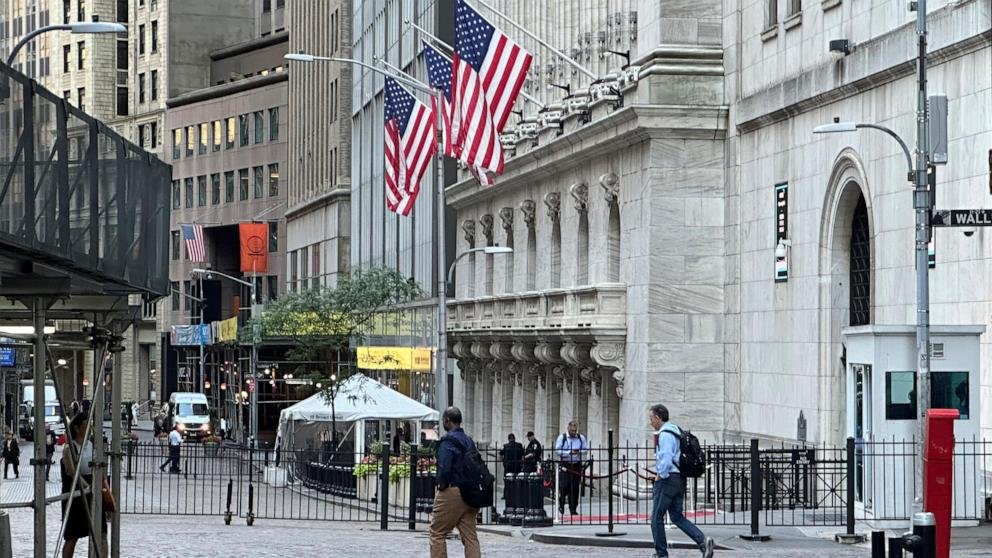U.S. stocks have fallen following a range of economic data, but hopes of upcoming interest rate cuts and continued Wall Street enthusiasm for artificial intelligence technology have kept stock indexes near record highs.
NEW YORK — Most U.S. stocks fell Thursday following mixed economic data, including the latest upbeat news on inflation, but hopes of upcoming interest rate cuts and continued enthusiasm on Wall Street over artificial intelligence technology kept indexes hovering near record highs.
The S&P 500 was down 0.1% in morning trading after soaring to an all-time high the previous day. The Dow Jones Industrial Average was down 257 points, or 0.7%, as of 10:40 a.m. Eastern time. The Nasdaq Composite was 0.3% above its all-time high.
In the bond market, Treasury yields fell again on growing confidence that inflation has slowed enough for the Federal Reserve to cut interest rates later this year.
The report found that inflation at the wholesale level was not as bad as economists had expected: Prices paid by wholesalers actually fell from April to May, when economists had predicted an increase.
That follows an unexpectedly upbeat update on consumer-level inflation released Wednesday. Federal Reserve Chairman Jerome Powell called the report encouraging and said policymakers need more of that data before cutting their key interest rate from its tightest level in two decades.
High interest rates are dragging down parts of the economy, particularly manufacturing. A separate report released Thursday showed that the number of people filing for unemployment benefits in the U.S. last week was higher than economists had expected but still low by historical standards.
Wall Street is hoping that job market and economic growth will continue to slow to ease inflationary pressures, but not slow enough to trigger a deep recession.
Shares in companies whose profits are most closely tied to the strength of the economy underperformed the market on Thursday following the report.
Dave & Buster’s Entertainment reported a bigger-than-expected drop in profits and revenues for its latest quarter, dropping 12.2%, citing a “complex macroeconomic environment,” among other things. Other companies have also detailed in recent days that they are seeing divisions among their customers, with lower-income households still struggling to keep up with high inflation.
Thanks to the ongoing excitement around artificial intelligence technology, some companies are experiencing rapid growth despite economic pressures.
Semiconductor company Broadcom Inc.’s shares rose 13.3% after the company reported its latest quarterly profit that beat analysts’ expectations, again buoyed by demand for AI. The company also raised its revenue forecast for the year.
Broadcom shares have soared to about $1,700, and the company will soon offer investors nine shares for every one they already own to lower the price and make it more affordable. That follows a similar move by Nvidia, which has become the poster child for the AI rush and is valued at more than $3 trillion.
Tesla shares rose 2.9% after Chief Executive Elon Musk said the early voting results indicated shareholders were ready to approve his compensation package, after he threatened to move AI research to another of his companies.
In the bond market, the yield on the 10-year Treasury note fell to 4.28% from 4.32% at Wednesday’s close and to 4.60% from 4.60% at the end of last month. The yield on the two-year note, which is heavily influenced by Fed expectations, fell to 4.71% from 4.76%.
Fed officials plan to cut interest rates once or twice this year, according to data from CME Group, and traders expect cuts to start as soon as September, which would ease pressure on the economy and boost prices of all investments.
Stock market indices across Europe fell as the leaders of the G7 major industrialized nations gathered in Italy. The European Parliament elections saw a surge in support for the far-right in countries such as France and Germany, and the effects of these elections are still being felt on the European continent.
France’s CAC 40 fell 1.9%, while Germany’s DAX dropped 1.7%.
In Asia, Japan’s Nikkei stock average fell 0.4 percent ahead of an interest rate decision by the Bank of Japan due on Friday. Stock indexes rose in Seoul and Hong Kong.
___
AP Business Writers Yuri Kageyama and Matt Ott contributed.

